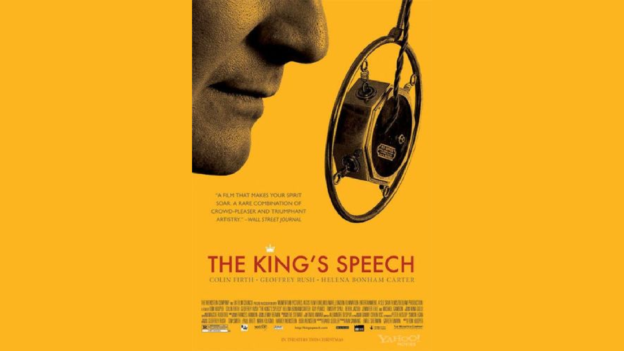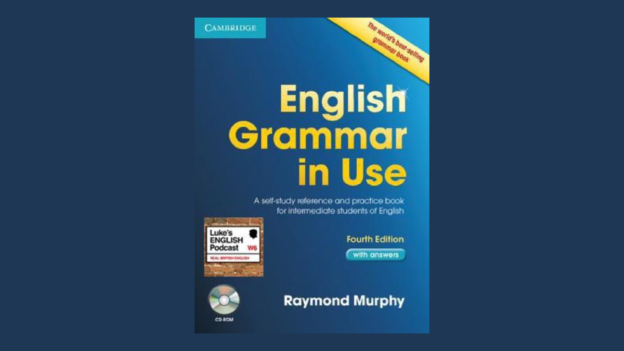Hi! Learn some really useful idioms and listen to an authentic interview with a native speaker in this episode of Luke’s English Podcast.
Right-click here to download.
The King’s Speech / Stammering
This episode is about The King’s Speech – an excellent film which recently won 4 Academy Awards at The Oscars, including the award for Best Actor for Colin Firth. In the film Colin Firth plays the part of King George VI, who had to overcome a difficult stammer and become a strong leader of Great Britain at the beginning of The 2nd World War. A stammer is a speech problem which makes the stammerer (the person who has the stammer) unable to produce words or sentences clearly. For some stammerers, it is almost impossible to speak without long pauses and the inability to produce some words clearly. Basically, it prevents many people from speaking and therefore has a strongly negative affect on their lives. There are millions of people in the world who suffer from a stammer, and their struggle is not often discussed or understood fully. The King’s Speech is a very high profile movie, and has brought the subject of stammering back into the public eye.
Contents
This is quite a long episode with lots of detail and content. Here is what to expect from the episode:
A. Some background information to the story of The Kings Speech
B. An interview with a member of the British Stammering Association, which is a charity for people who have a stammer. In the interview he talks about the story of King George VI, the importance of the film for stammerers, and the subject of stammering. I explain what the man says in the interview, and clarify it for you
C. Useful vocabulary: I teach you some commonly used idioms which feature the words ‘mouth’ and ‘tongue’
This is definitely a useful podcast episode! You should listen to all of it several times to really get the benefit of it.
A. Some background Information
The King’s Speech is a true story of King George VI and his struggle with a speech impediment, or ‘stammer’. Here is a definition of ‘stammer’ from the Cambridge Advanced Learner’s Dictionary (which is available free online here http://dictionary.cambridge.org/):
stammer
verb /ˈstæm.ər/
Definition
to speak or say something with unusual pauses or repeated sounds, either because of speech problems or because of fear and anxiety
[+ speech] “Wh-when can we g-go?” she stammered.
He dialled 999 and stammered (out) his name and address.
Synonym: stutter
stammer
noun [C usually singular]
Robert has a bit of a stammer.
(Definition of stammer verb from the Cambridge Advanced Learner’s Dictionary)
In the film, prince George has suffered from a very strong stammer ever since he could speak. His family would correct and punish him when he stammered. As a result, George suffers from a terrible lack of confidence, particularly when speaking in public. He cannot speak in publis as it causes him to stammer uncontrollably, causing total shame and embarrassment to all around. When he addresses the public it is a shocking and disappointing failure on a national level. This happened at a time when people were not sympathetic to someone with speech problems and in a king it would have been a huge sign of weakness. But, George must become the King when his country is about to go to war with Germany, so he has to learn to overcome his speech impediment in order to regularly address the public over the radio.
So, he takes speech therapy from a therapist called Lionel Logue. It is a tremendous struggle but together they manage to develop a relationship (between a king an an ‘ordinary’ man) which helps the king to learn to speak to the public in a confident manner. It’s a fantastic film about human struggle, challenge and bravery.
Here’s the trailer for the film:
[youtube http://www.youtube.com/watch?v=pzI4D6dyp_o&w=640&h=390]
B. The interview with a member of the British Stammering Association
This is an interview with a man who has a stammer. He has obviously overcome his speech problem and you can hear in this interview that he is now a clear speaker of English. Sometimes he has difficulty with individual words, but it does not prevent us from understanding what he says.
Questions
Here are the questions I ask you before the interview on the podcast: (you will find the answers further down the page)
1. How many high profile stemmerers have we had in the UK since George VI died in 1952?
2. How many decent films about stammerers have there been?
3. How have stammerers been shown in films?
4. What does The Kings Speech show people who don’t stammer?
5. Is the film historically accurate?
6. What do we know about stammering now?
7. Was the stammer caused by something that happened during his childhood?
8. How did his family and staff deal with George’s stammer?
9. How did this make him feel?
10. With today’s knowledge, what is the best way to help people with stammers?
11. What did George VI’s therapist do that the speaker’s (interviewee’s) therapist didn’t do?
12. What made George VI a difficult client?
13. What will The King’s Speech do for stammerers and non stammerers?
14. What is the danger about the near future?
Here is a video of the interview (it starts after 20 seconds): Answers below
[youtube http://www.youtube.com/watch?v=UwuJklTw-Yw&w=480&h=390]
Transcript of the Video (Thank you Piotr from Poland)
[16:40 – The King’s Speech movie – a stammerer’s view]
Hello, I have a stammer.
There hasn’t been really high profile stammerer in the UK since king George VI died in 1952, a very long time ago, nor has there been a decent film featuring someone who stammers.
Generally speaking, we have been shown as figures of fun (ha ha). As a result of this and many other inaccuracies very few people know anything much about stammering.
But now at last we have “The King’s speech”, potentially Oscar winning film, which shows people who don’t stammer how life can be if you do. And Colin Firth does an incredibly realistic job of conveying how it is to be stuck in a block with no control over your speech, part of the audience staring at you and part staring at the ground. No film has ever done that before.
So it should be very helpful in terms of creating some greater understanding between stammerers and non-stammerers. But we need to remember that the action takes place about seventy five years ago, so it is history. From what we know, it’s a fairly realistic reenactment what was going on at that time.
Things are different now of course. We know that stammering it’s a symptom of a condition in which the brain’s neural circuits for speech have not wired normally. So the king would have been born with a neural propensity to stammer, it wasn’t caused by some deep rooted psychological problem. His character and behaviour would have been partly affected by this inability to say what he was trying to say, not vice versa.
It’s quite interesting there was a research exercise on at about the same time which is come to be known as the “monster study” in which a group of orphan children were cruelly encouraged to stammer. At the end of the exercise, none of them grew up stammering, but several of them developed psychological problems.
Of course, speech therapy techniques has changed considerably. When he was a child, stammering was thought to be a defect. So, the future king was corrected and even punished by his family and staff which made him very self-conscious and tense about speaking and that surely would just make his stammering even worse. Today where it is available and it’s available everywhere. Early intervention allows the vast majority of those very young children at-risk of persistent stammering to talk fluently for the rest of their lives.
Some adults do find ways to control their speech, but there is still no cure. The King continued to stammer, but as we see in the film, Logue helped him to control his stammering when he was making formal speeches. I must say though that the last time I went to see a speech therapist, she didn’t encourage me to swear. But then… I’m not a king, you understand. And that really is the main point of this film. It was how Lionel Logue found a way to form a relationship with a client, whose upbringing had made him reluctant to discuss anything personal.
As stammerers, we are one ideally equipped to stand up and change so many misconceptions. But we need to try. “The King’s speech” will give stammerers and non-stammerers a kind of a permission to talk to each other. It will be the greatest opportunity, I’ve ever seen, for this often embarrassing subject to be discussed openly and on such a broad scale.
So for all our sakes, please grasp it with both hands, talk about it. But remember that the opportunity will only last for a short while. After that, there is a danger that stammering will slip back into being inaudible and invisible. We don’t want that to happen. So if you feel you’d like to help, please stay tuned. But in the meantime, I just like to say: “Thank you for listening”.
[21:40]
Answers
1. How many high profile stammerers have we had in the UK since George VI died in 1952?
(None)
2. How many decent films about stammerers have there been? (none)
3. How have stammerers been shown in films? (they have been shown as figures of fun)
4. What does The Kings Speech show people who don’t stammer? (it shows how life can be if you do)
5. Is the film historically accurate? (yes – it’s a fairly realistic reenactment)
6. What do we know about stammering now? (it’s a symptom of a condition in which the brain’s neural circuits for speech have not wired normally)
7. Was the stammer caused by something that happened during his childhood? (no – he was probably born with it)
8. How did his family and staff deal with George’s stammer? (they corrected him and punished him)
9. How did this make him feel? (very self conscious and tense about speaking)
10. With today’s knowledge, what is the best way to help people with stammers? (early intervention)
11. What did George VI’s therapist do that the speaker’s (interviewee’s) therapist didn’t do? (he encouraged him to swear – to say rude words like f*ck and sh*t)
12. What made George VI a difficult client? (his upbringing had made him reluctant to discuss anything personal)
13. What will The King’s Speech do for stammerers and non stammerers? What will The King’s Speech do for stammerers and non-stammerers? (it will give them permission to talk to each other about stammering – “for all our sakes, please grasp it with both hands, talk about it”)
14. What is the danger about the near future? (after a while, stammering will slip back into being inaudible and invisible – “please stay tuned”)
Here is some information about the video interview
n The King’s Speech, Colin Firth did an incredibly realistic job of conveying how it is to be stuck in a block with no control over your speech. No major film had ever done that before, and I’m sure it has been helpful in terms of creating greater awareness of something which is largely inaudible and invisible in our society.
But there is still a great deal of ignorance about why we stammer, and very inaccurate assumptions are made about our characters. We are not ideally equipped to stand up and change these misconceptions, but we need to try. The King’s Speech has given everyone – stammerers and non-stammerers – a kind of ‘permission’ to talk to each other about stammering. It has been the best opportunity, almost in living memory, for this often embarrassing subject to be discussed openly and on such a broad scale. So, for all of our sakes, please keep talking about it!
For an interview with Colin Firth about his role as the King, please go to www.stammering.org/colinfirth.html And for more information on The Monster Study, see http://en.wikipedia.org/wiki/Monster_study
If you want to know more about the National Appeal for Change, or to make a donation, please go to www.stammering.org/change
If you want to talk about helping in some other way, please send a message to Leys Geddes through the speakingout2 channel on YouTube or by emailing chair@stammering.org
If you are in the UK, and want help with your speech, please ring the British Stammering Association helpline on 0845 603 2001 or visit www.stammering.org
The BSA is the national charity and is run by people who stammer, for the benefit of all those whose lives are affected by stammering.
If you live outside the UK, and want advice about stammering/stuttering – or simply want to learn more – you can still go to www.stammering.org or to any of these other leading sites: www.stutterisa.org (International Stuttering Association), www.stutteringhelp.org (USA), www.stutteringhomepage.org (USA) or http://en.wikipedia.org/wiki/Stammering.
If you like to see an adaptation of this video, spoken in Swedish, please go to http://www.youtube.com/watch?v=uB9TDLkovm4
C. Useful Vocabulary – Idioms with the words ‘mouth’ and ‘tongue’
I thought it would be appropriate to teach you some commonly used fixed expressions which feature these two parts of the body which are so important for speech. Here are the idioms with examples and definitions. All this for free? You lucky people!
“Me and my big mouth!”
-use this when you have said something you shouldn’t have said, like when you give away a secret by accident. “Oh, me and my big mouth!”
“to be born with a silver spoon in your mouth”
-this means to be born into a rich family. It is often used to complain about people who are born into a rich life.
“Prince William doesn’t know what it is like to work hard like normal people. He was born with a silver spoon in his mouth.”
“don’t look a gift horse in the mouth”
-use this to say that you should accept a gift without checking it for problems first. Don’t look for problems in the gift too much, just accept it. “I didn’t want to accept my uncle’s old car, but he told me not to look a gift horse in the mouth”
“live from hand to mouth’
-this is when someone lives on very little money – they spend the money they earn and can’t save anything. “There’s no way we can go on holiday this year, we are living from hand to mouth”
“melt in your mouth”
-use this to describe delicious food that is so soft and tender that it feels like it is melting in your mouth. “The steak here is so delicious, it just melts in your mouth”
“put your money where your mouth is”
-show that you really mean what you say, by doing it rather than just talking about it. “You’re always talking about running a marathon, so come on, put your money where your mouth is. Why don’t you run the London Marathon with me next year?”
“Keep your mouth shut! / Shut your mouth!”
-this means ‘shut up’ or ‘don’t way anything’. It’s a bit rude. “When the police arrive, just keep your mouth shut, all right?!”
“to leave a bad taste in your mouth”
-for food it means that it tastes disgusting and the bad taste stays in your mouth. We can also use it to describe a bad experience, which leaves us feeling bad afterwards. “The argument just left a bad taste in my mouth”
“Watch your mouth!”
-be careful what you say!
“by word of mouth”
-use this to say that information is transferred by people talking to each other. “Publicity for the film spread by word of mouth”
“to put words into someone’s mouth”
-this means to suggest that someone has said something which in fact they haven’t said. “I didn’t say that! You’re putting words into my mouth!”
“to bite your tongue”
-this means that you stop yourself saying something
“When he asked me about the missing biscuits, I just bit my tongue and kept quiet”
“has the cat got your tongue?”
-use this to challenge someone who is unable to say something, keeping quiet
“So, what about the missing biscuits then? Huh? What’s the matter? Cat got your tongue?”
“mother tongue”
-your first language
“English is not his mother tongue”
“on the tip of my tongue”
-this means you can’t quite remember the word – you can nearly remember it
“What’s his name? Errrmmmm…. wait, I can remember… oh! It’s on the tip of my tongue! Oh, no, I can’t remember”
So, that is it for this episode. There’s a lot of content here for you. I recommend you listen to this episode several times. Try to use the idioms and other words you have learned here. Use them in conversation, or just say a few sentences to yourself. Personalise the sentences. Use the idioms to talk about your own life and experience. This will help you learn it.
You could donate some money to me to help me with the podcast, but really I think it would be better to donate money to help people in Japan who are suffering from the terrible tsunami which struck last week. There are many many people who have no food, shelter or electricity. Search on google for your local charity organisation, or give money here http://www.redcross.org.uk/japantsunami/?approachcode=68816_googlePAD10JpTs&gclid=CNqNvd-70acCFdFX4QodMVXiDA .
You could save some lives.
Thanks for listening.
Luke





